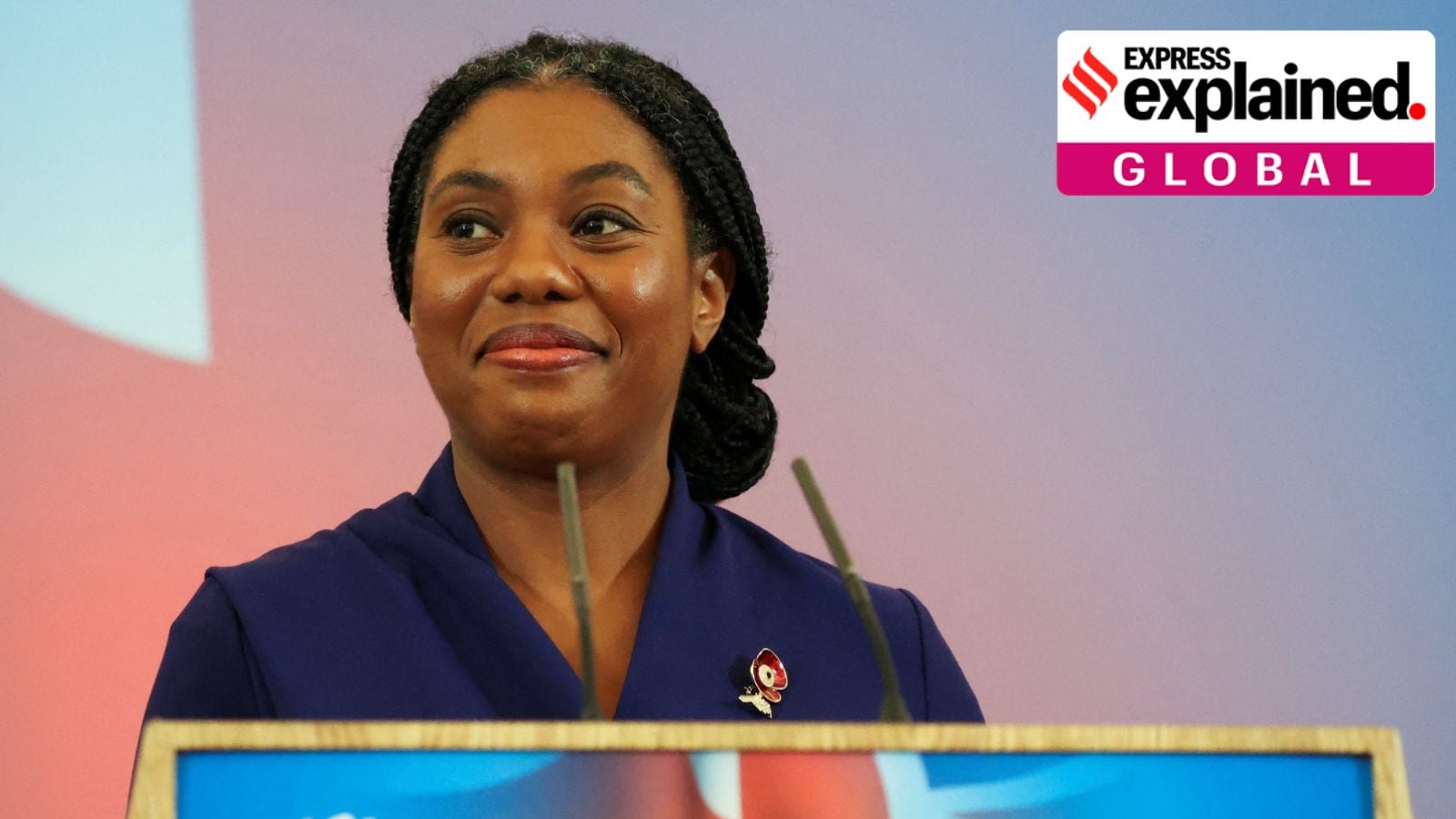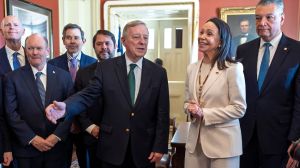5 things about Kemi Badenoch, who replaced Rishi Sunak as Conservative Party chief
Badenoch said the party needed to return to its “first principles” of freedom and individual responsibility.
 Kemi Badenoch speaks on stage, on the day she was announced as the new leader of Britain's Conservative Party, in London, Britain, November 2, 2024. (REUTERS/Mina Kim)
Kemi Badenoch speaks on stage, on the day she was announced as the new leader of Britain's Conservative Party, in London, Britain, November 2, 2024. (REUTERS/Mina Kim)Britain’s Conservative Party on Saturday (November 2) named Kemi Badenoch, 44, its new chief, making her the first black politician — and black woman politician — to lead a major British party. She replaced Rishi Sunak and took over the beleaguered party after it lost the general election earlier this year.
“It is the most enormous honour to be elected to this role, to lead the party that I love, the party that has given me so much,” she said after narrowly defeating her rival, former Cabinet Minister Robert Jenrick, in a party-wide vote.
Badenoch said the party needed to return to its “first principles” of freedom and individual responsibility. She identified the party’s immediate challenges as holding the ruling Labour Party government to account and identifying and implementing a clear plan for the Tories, without specifying details.
She now faces the challenge of steering right-wing voters back to the Tory fold and away from MP Nigel Farage’s Reform UK party, which had made political gains at the Conservatives’ cost this year. But who is Kemi Badenoch and what are her policy positions? We explain.
- 01
From childhood in Nigeria to UK Parliament
Born Olukemi Olufunto Adegoke in London, one of three children to Nigerian parents (a doctor father and a physiology professor mother), Badenoch grew up in the Nigerian capital of Lagos. When she was 16, her family relocated to the UK to escape political instability in Nigeria.
She holds degrees in engineering and law from Sussex University and Birkbeck College. Before joining politics full-time, she worked as an IT professional and in consultancy, and briefly served as digital director for the conservative magazine The Spectator. She is married to Hamish Badenoch.
Her time in university reportedly “radicalised” her against the left-wing campus culture. According to Blue Ambition, a biography authored by Michael Ashcroft, she described the student activists as “spoiled, entitled, privileged metropolitan elite-in-training” for protesting the introduction of tuition fees.
This motivated her to join the Conservative Party in 2005. She unsuccessfully contested the 2010 general election and polls for the 2012 London Assembly (an elected deliberative body for the city). She was elevated to the London Assembly in 2015 and to the House of Commons in 2017, from the safe seat of Saffron-Walden in southern England.
- 02
Margaret Thatcher as her idol
Over the years, Badenoch has been likened to Margaret Thatcher, Britain's first woman Prime Minister and Tory leader. She has often cited Thatcher as an inspiration and said she shares her “values of self-reliance, personal responsibility and free markets.”
As a schoolgirl growing up in Nigeria, she reportedly referred to the former PM as an example of an uncompromising woman politician who got things done. According to an analysis in The Independent, this influence is reflected in her own headstrong approach and willingness to be confrontational about topics she is passionate about.
Cynics have accused Badenoch of merely paying lip service about her commitment to free markets and capitalism, with The Economist describing her “lack of interest in economics” as “distinctly un-Thatcher-like.”
- 03
Views on gender, related to biological essentialism
Badenoch waded into controversy this June, over a row with popular British actor David Tennant about her views on transgender rights. As then Equalities Minister in the UK government, she had supported banning trans women from using women’s toilets and joining women’s sports teams over “safety of women and girls”.
An advocate for trans rights, Tennant asked Badenoch to “shut up” while accepting an award for Celebrity Ally at the British LGBT awards. Following this, she posted on X, saying, “I will not shut up. I will not be silenced by men who prioritise applause from Stonewall (an LGBTQ charity) over the safety of women and girls... Do not let the bigots and bullies win.”
In the past, she has identified as a Gender Critical feminist, referred to transgender women as men, and has opposed attempts to change British laws to allow self-identification of transgender identities. Her views are thus aligned with biological essentialism.
- 04
Opposition to Critical Race Theory
At the height of the Black Lives Matter protests in 2020, Badenoch, then the Equalities Minister in Boris Johnson’s cabinet, drew criticism for saying “Britain is one of the best countries in the world to be black”.
In a 2020 interview with The Spectator, she described Critical Race Theory as the Conservative Party’s new enemy to fight. The intersectional ideology studies the role of race (or rather how society views race) in influencing politics and institutions. She said it “portrays blackness as victimhood and whiteness as oppression.”
She has further accused its proponents of wanting “a segregated society” and accused it of creating a “prison for black people” by “associating being black with negativity, oppression and victimhood in an inescapable way”.
In the process, she branded herself as an “anti-woke” politician and has been accused by the Labour Party of being a “culture warrior”.
- 05
Views on immigration
Upon her election to Parliament in 2017, Badenoch described herself as a first-generation immigrant. But over the years she has joined calls to restrict immigration to Britain, saying many migrants viewed the country as a “dormitory” or “sponge” and did not intend to contribute meaningfully to British society.
Addressing the Tory party conference last month, she said “numbers matter but culture matters more,” and that cultures that carry “ancestral ethnic hostilities” should not be welcomed if they do not align with British values. This was a far cry from her views in 2018, when she favoured relaxing restrictions on visas for skilled immigrants.
- 01
- 02
- 03
- 04
- 05






































